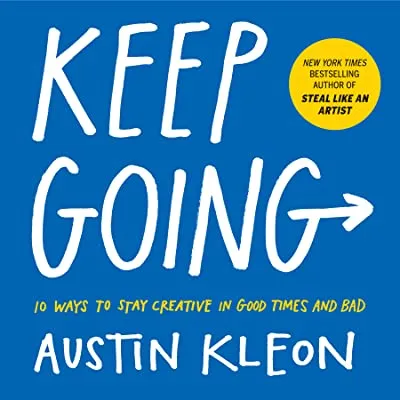Keep Going: 10 Ways to Stay Creative in Good Times and Bad
 by Austin Kleon
by Austin Kleon Discover the art of enjoying your creative work and keeping you going.
If making your art is adding net misery to the world, walk away and do something else. Find something else to do with your time, something that makes you and the people around you feel more alive.
What you choose to pay attention to is the stuff your life and work will be made of.
It’s easy to become as obsessed with online metrics as money. It can then be tempting to use those metrics to decide what to work on next, without taking into account how shallow those metrics really are.
A free creative life is not about living within your means, it’s about living below your means.
You must be mindful of what potential impact monetizing your passions could have on your life. You might find that you’re better off with a day job. When you start making a living from your work, resist the urge to monetize every single bit of your creative practice. Be sure there’s at least a tiny part of you that’s off-limits to the marketplace. Some little piece that you keep for yourself.
One of the easiest ways to hate something you love is to turn it into your job: taking the thing that keeps you alive spiritually and turning it into the thing that keeps you alive literally.
We used to have hobbies; now we have “side hustles.” As things continue to get worse in America, as the safety net gets torn up, and as steady jobs keep disappearing, the free-time activities that used to soothe us and take our minds off work and add meaning to our lives are now presented to us as potential income streams, or ways out of having a traditional job.
The great artists are able to retain this sense of playfulness throughout their careers. Art and the artist both suffer most when the artist gets too heavy, too focused on results.
Job titles, if they’re taken too seriously, will make you feel like you need to work in a way that befits the title, not the way that fits the actual work. Job titles can also restrict the kinds of work that you feel like you can do. If you only consider yourself a “painter,” then what happens when you want to try out writing?
When you reach for your phone or your laptop upon waking, you’re immediately inviting anxiety and chaos into your life. You’re also bidding adieu to some of the most potentially fertile moments in the life of a creative person.
What your daily routine consists of is not that important. What’s important is that the routine exists. Cobble together your own routine, stick to it most days, break from it once in a while for fun, and modify it as necessary.
The creative life is not linear. It’s more like a loop, or a spiral, in which you keep coming back to a new starting point after every project. No matter how successful you get, no matter what level of achievement you reach, you will never really “arrive.” Other than death, there is no finish line or retirement for the creative person.